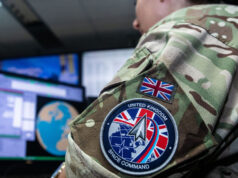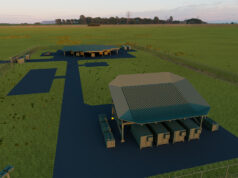The Minister for Defence Procurement has started Skynet 6A satellite production at Airbus in Stevenage.
Jeremy Quin MP, the UK’s Minister for Defence Procurement, visited Airbus in Stevenage today and pushed the button to start production of the first panel skin for the UK MOD’s next generation military communications satellite Skynet 6A.
Skynet is a family of military communications satellites operated by Airbus Defence and Space on behalf of the United Kingdom’s Ministry of Defence The first was launched in 1969, pre-dating the Terminator films with a villain Artificial Intelligence of the same name.
Airbus say:
“The Defence Minister started the high precision cutting machine to profile the first aluminium panels of the near six ton Skynet 6A satellite which is based on Airbus’ Eurostar Neo telecommunications spacecraft and visited the extensive cleanroom facilities on site. Airbus was awarded the more than £500m contract to design and build Skynet 6A in July 2020 and the programme achieved its Preliminary Design Review in December 2020.”
Defence Minister Jeremy Quin said:
“Secure military satellite communications are vital for our ability to conduct operations on a global scale. Seeing the first hardware for the next generation Skynet 6A satellite shows we are on track for launch in 2025 and ready to upgrade and enhance the UK’s global military communications network.”
Richard Franklin, Managing Director of Airbus Defence and Space said:
“Airbus in the UK is a world leader in the design and manufacture of military and commercial telecommunications satellites, and working hand in hand with the Defence Digital team we have overcome the challenges of Covid and are on track with the programme. We also look to future export opportunities which will benefit the wider space ecosystem and are actively engaged with bringing on board a wider spread of UK SMEs to deliver this essential sovereign capability.”
Skynet 6A will extend and enhance the Skynet fleet. The contract signed with the UK involves the development, manufacture, cyber protection, assembly, integration, test and launch, of the military communications satellite, Skynet 6A.
The contract also covers technology development programmes, new secure telemetry, tracking and command systems, launch, in-orbit testing and ground segment updates.










It is a positive that this new constellation will be owned and operated by Space Command, as I am against privatisation generally but especially assets such as this.
Previously, from early 2000’s it has been either a GOCO – Government Owned, Contractor Operated, or COCO, set up, with the RAF’s 1001 SU being disbanded with Paradigm originally running things, though the all important ground stations and control infrastructure remained on MoD property.
For interest, wider ground based infrastructure –
MoD Oakhanger – Telemetry and Command Station and a SGS, also has a NATO SGT.
Azimghur Barracks, Colerne – SGS and Satcom Network Control Centre.
Hawthorn Site, Corsham – Network and Spacecraft Ops Centre, on the site of the old Cold War CDCN bunker.
Episkopi, Cyprus – SGS.
Mount Pleasant, Falklands, Remote site – SGS.
Adelaide – SGS, New site with the “tilt” to the Pacific, but run by Airbus.
The site at Defford was closed.
Other sites I won’t list.
The UK really needs to get its act together space wise and get a sovereign IMINT capability too beyond Carbonite 2, and hopefully other assets in due course.
I’m no expert in this but, as usual I agree with you completely Daniele. i just wish that MBDA/AIRBUS at Stevenage (formally BAe site) was not French-owned, and we had our own independent satellite/space capability to really grasp the possibilities of the UK in space – something that we had dropped the ball with over the last 60-years!. Also the need for our own GPS network. Maybe companies like INMARSAT or SURREY SATELLITES could help? We could really kick off a civilian industry but underpinned by a strong autonomous military capability.
Ditto missiles, drone stuff, Ai, SAR, directed energy, MBTs etc.
Surrey Satellites is owned by Airbus now too. When BAE exited civil aerospace to focus on Defence they sold their shares in EADS/Astrium to their other partners.
Bums.
OK. Thanks Watcherzero. In a way it helps make my point that all our industry has already been hollowed out too far already by overseas companies which I would argue is not a good situation in terms of key strategic critical industries.
Why does it matter? Airbus are interested in the capabilities of these sites and facilities and clearly invest in them. When was the last time BAE invested significantly in a facility except when it was mandated and paid for by an MoD contract?
Why, well:
Profits remain in the UK.
IP remains in the UK.
Design & development skills are more likely to be in the UK.
Wider sub-contractors more likely to be UK-based.
…and, crucially, if push-comes-to-shove, the UK is not reliant on others who may well be unreliable or even unhelpful. (see history)
It’s a bit like the offshore wind industry. We pay for it, but very little UK owned or sourced. now that can’t be right, surely for a so-called major industrialised nation?
…and whilst we are on the subject, why not team up with our wonderful Aussie cousins again with space stuff. Dust off a few old tracking stations across the globe and get Woomera functioning again as a test site.
So by that argument then Rolls Royce, Babcock, Martin Baker, BAe etc.should pull out of the USA, Sweden, Germany, Singapore, Oman, Australia and so on? Airbus Limited is a UK company, it will need to pay its shareholders (presumably Airbus in Europe), but it will also have to abide by UK law. IP is complex – it could belong to MOD, Airbus Limited or be shared with Airbus more widely – the contractor will have a big say in that.
No James, that is not what I am saying. UK-based/owned companies that have projects and subsidiaries in other countries are great (provided they do not give away key strategic technologies).I’m on about things the other way around whereby our strategic industries get hollowed out by foreign ownership.
OK, there may be a notional UK-listed company but shareholders get little (dividend) and main profits go overseas.
Now the thing of what is a UK company is a bigger argument. I would argue for key strategic companies, the UK should impose say a 30% limit on foreign ownership and not have directors who also sit on the boards of rival or overseas agencies. Its a bit like who owns / is allowed to own land or property in the UK.
do you have a source for skynet 6 being owned and operated by space command mate? just curious.
Several quotes since SpCom was formed that it’s coming back in house.
Lots happening in this area it appears!
Achieved 36 days of stratospheric flight, across two 2021 flights, proving Zephyr’s status as the only HAPS able to perform at length in the stratosphere.
Set a new world record for absolute altitude for this class of UAS at 76,100ft.
Secured and exercised FAA flight approvals operating inside the US National Airspace System (NAS)
Demonstrated successful flight with multiple payload integrations and tested new OPAZ payload, streaming Earth observation data.
Proved Zephyr can operationalize the stratosphere, achieving some 2,435 total flight hours and demonstrating precise stratospheric manoeuvrability and station-keeping over points on the ground.
https://www.airbus.com/newsroom/press-releases/en/2021/10/airbus-zephyr-solar-high-altitude-platform-system-haps-reaches-new-heights-in-its-successful-2021-summer-test-flights.html